- Home
- Elizabeth George
SW01 - The Edge of Nowhere Page 11
SW01 - The Edge of Nowhere Read online
Page 11
JENN FOLLOWED THEM, curiosity getting the better of her. Some of the people who’d emerged from the woods trailed after her. The dopers remained. So did Seth because, Hayley hadn’t moved, and he wanted to talk to her. There was something strange about her being in Saratoga Woods by herself, and although Seth knew this wasn’t his business, he also had a way to get her to talk, and he intended to use it.
He said, “So, Hayley, you still hooking up with—”
“Stop it.” She’d been watching the ambulance and the people running after it. She turned back to Seth. He thought stupidly how pretty she was, how she’d always been pretty, and how the nicest thing about Hayley Cartwright was that she didn’t know she was pretty. She said, “Okay, Seth? Stop it. Okay?”
He said, “Hey, just a friendly question. Isn’t that what you wanted: you and me just being friends?”
“You don’t know how to be anyone’s friend,” she told him.
“Oh, that stings, chick,” Dylan Cooper said. He and his buddies had moved into a tight little enclave of whispered conversation.
“Shut up,” Hayley said. “Why don’t you go smoke another joint.”
“I will if you will,” Dylan told her.
“Can it,” Seth snapped.
He took Hayley’s arm. They moved away from the others. He said, “What’re you doing here alone, Hayley?”
She said, “What’re you doing here alone?”
“I’m not alone. Gus’s in the car.”
“Well, pardon me for not having a dog to walk.”
“How’d you get here, anyway? Where’s the truck? You come over from Keller Road or something?” Not that it was any of his business, but something was going on. Hayley Cartwright was a cautious girl. She never went into the woods alone.
She said, “Look, if you have to know, the truck’s down at the Metcalf Woods entrance. I came that way. Are you satisfied?”
“The Metcalf entrance?” Seth wanted to add, “You mean the one with the big No Parking sign? The one that tells you to take your vehicle over to Keller Road if you want to go into those woods? The one that makes it easy to hide your truck from anyone passing by? Is that the entrance we’re talking about, Hayl?” But he didn’t say that because he felt queasy at the thought of Hayley hiding even more from him than she’d hidden already. So he repeated, “The Metcalf entrance? Why’d you park there?”
She said, “Gee, Seth, as if it matters right now,” which was also her way of saying “as if it’s your business.”
He wanted to argue, but a sheriff’s department car pulled into the parking lot then. At this, the collection of dopers beat a very quick retreat back into the woods. A deputy got out, observing their flight. He pulled some sunglasses from the breast pocket of his shirt, and he squinted over in the direction of the ambulance before he put the glasses on. He walked to where Seth and Hayley were standing.
He said to Hayley, “You make the call?”
Hayley said, “What call?”
The deputy said to Hayley, “Empty your pockets. Let me see your bag.”
“What the heck?” Seth knew exactly what the deputy wanted: Becca must have used a cell phone to make that 9-1-1 call. It was time to play dumb. “What’s she supposed to have on her?” he asked. “This a drug bust or something? Come on, man. Why’re you hassling her?”
Hayley said, “It’s okay,” and she handed over her bag. She said, “I don’t get why—”
Seth said, “Leave her alone. She didn’t do anything.”
The deputy looked at him. His glasses were too dark to see his eyes but his mouth was like a ruler line drawn on his face, and Hayley said again but more cautiously this time, “It’s okay, Seth.” She waited for the deputy to do whatever he needed to do, which was find the cell phone, which of course she didn’t have. Hayley didn’t even own a cell phone. In her family that would have been a luxury.
The deputy did his business with the bag and handed it back. He said to them, “Stay put,” and he set off across the meadow.
The paramedics were coming out of the woods with Mrs. Kinsale walking behind them. They had the stretcher between them. An IV drip was hanging from a pole attached to the stretcher, and just as the paramedics were about to load their patient up, the deputy reached them. Words were exchanged.
Then the oddest thing happened. The paramedics loaded the kid into the ambulance and one of them got inside with him. The other went to the driver’s side and climbed in, but he didn’t start the engine and they didn’t take off. They didn’t go anywhere. That could only mean one of two things. IV drip or not, either Derric Mathieson was dead and there was no big rush or he was so badly hurt they were radioing for a helicopter because they didn’t want to risk the long drive to the hospital in Coupeville, midway up the island.
Hayley said, “Oh my God. Did someone die?” and Seth felt cold from head to toe. Dead in the woods would be very bad.
The deputy was coming toward them at a run.
SETH SAID TO him, “What’s happening, man? What’s going on?”
The deputy’s name tag said that he was Deputy Picarelli, a squat individual who’d probably spent too much time eating the pies on sale at some of the farmers’ markets. He shot Seth a look that said if any questions were going to be asked, the deputy was going to be doing the asking. Then he said, “Come with me. Tell the others,” and he indicated the rest of the people within the meadow.
Seth did so, although the dopers he could do nothing about. They were long gone. He herded everyone else over to the patrol car, where the deputy was on the radio with someone, his privacy guaranteed by the rolled-up windows. When he was finished with the radio, he opened his door and from the car he started asking for names.
At each name, the deputy typed into a laptop that was attached to the dashboard and took up some of the space of the passenger’s seat. He nodded with each one and said, “Okay. You can go. We’ll be in touch,” although no one knew what he’d be in touch about.
Then he got to Seth. Seth said his name. He didn’t need to spell it because the island was crawling with Darrows, and the deputy was probably going to know some of them. Seth’s grandfather had been one of five sons, and all of them still lived on Whidbey.
Deputy Picarelli nodded and typed Seth’s name into his laptop. Seth hitched up his jeans and got ready to leave, like everyone else. But that was when things changed.
Picarelli got out of the car. He opened the back door. He said to Seth, “Get inside,” and he wasn’t offering him a friendly ride.
* * *
THIRTEEN
There was only time to take care of Gus. Seth said to Hayley, “Gus’s in Sammy. Can you take him—” before the door was closed and he was in the back of the cruiser.
She nodded, but she cried, “Seth! What did you do?”
The deputy pulled out of the parking lot, heading south on Saratoga Road. Seth said to him, “Are you going to tell me what’s going on?” but the only thing Picarelli said was, “Bench warrant, kid. Got to take you in.”
Bench warrant? Seth was no expert on things related to the law, but he knew that bench meant a judge had been involved. A judge had ordered him arrested, but he couldn’t come up with a single reason why. Still, he felt a tiny bit relieved because whatever he was being taken up to the jail in Coupeville for, it wasn’t about this.
When they arrived at the sheriff’s office some thirty minutes later, Seth expected the patrol car to stop in front. But that didn’t happen. Instead a huge door yawned open in the building and they drove inside an enormous, tall, and decidedly forbidding parking bay. It was like a garage from which no one escaped, especially when its metal door crashed down with a sound of finality that did what it was intended to do: It scared Seth nearly out of his shorts.
He knew this place, not because he’d been here before but because it was part of Whidbey Island’s history. Right beyond a thick metal door that he was looking straight at was a small room where a Breathalyzer sat o
n a table with a chair in front of it. There, anyone suspected of drunk driving was tested. Also right there in that very same room a kid just one year older than Seth had pulled out a gun from the crotch of his jeans and had shot two deputies dead.
Deputy Picarelli got out and opened Seth’s door. He took his arm and heaved him up. Seth wondered if for some crazy reason the deputy thought he’d been driving drunk.
Things became clear when they walked past the Breathalyzer and finally got inside the booking area. This wasn’t a place where people smiled and greeted the incoming losers, but at least they shared information with anyone who was being booked. Being booked consisted of having virtually everything on him taken off him. Being booked meant fingerprints. Being booked meant learning that he’d failed to pay two speeding tickets, one for doing seventy on highway 525 and one for doing sixty-three on Langley Road. In both cases, he’d been trying to get to the ferry on time. But they took this sort of thing seriously on the island. They didn’t like speeding and they didn’t like people who didn’t pay their fines when they were caught.
Seth had completely forgotten the fines. He said, “Hey, I’ll pay them now,” although he had exactly five dollars and thirty-eight cents on him.
He was told politely that things didn’t work that way when other things got to this point and a bench warrant had thus been issued in his name. When that happened, bail was one thousand dollars, which of course he could pay if he wished to do so. Otherwise, he would be spending the night in Hotel Lockup and tomorrow morning he could explain via video to the judge up in the town of Oak Harbor why he thought traffic fines didn’t apply to him.
“But I forgot, I forgot!” didn’t get him far. Where it got him was locked into an interview room where he could “consider his options,” as he was told.
The interview room was painted the yellow of dirty banana skins. It featured a table, a chair, a stool, and an enormous picture window whose view was of a bank of television monitors and the deputy in charge of watching them. That he was also in charge of watching Seth was something that became obvious when he waved hello from his perch at the monitors and made a no-no shaking motion with his hand and jerked his hand above his neck. From this Seth took it to mean that he wasn’t to hang himself while he was in the interview room. No problem there, was what Seth thought. Unless he managed to do it with his socks, he didn’t have anything he could use for the job.
He sat on the stool and not the chair because that was where he was told to sit. He put his arms on the table and his head in his hands and he wondered what was going to happen. Nothing about being where he was at the moment was going to impress his parents.
When he’d dropped the bomb on them that he wanted to leave South Whidbey High School, they’d thought Seth meant he preferred to attend the alternative school, lodged in an 1895 schoolhouse in a crossroads called Bayview Corner. When he’d dropped the bigger bomb that he was finished with going to school altogether, they hadn’t panicked the way some parents might have. They understood his learning disabilities. They understood his talent and passion for guitar. They were artists themselves, so they’d just sat him down and named the conditions for the new life he was proposing for himself: a tutor to help him study for the GED, a part-time job, and consistent rehearsals of the trio with whom Seth had played the gypsy jazz of Django Reinhardt for the last four years. So far, he’d managed two of the three conditions with his job at the Star Store and regular rehearsals as well as gigs with the trio. He was having real trouble with the other one, though.
His parents didn’t know this. They assumed his hours not at work were being filled with study as well as guitar strings. So Seth liked to stay under their radar, which meant that letting them know he was in the county jail was out of the question. As artists, they couldn’t afford to spring him anyway, and they also couldn’t afford to pay his fines.
The door opened in about twenty minutes. Seth looked up and said, “I get a phone call. I want to make it.”
The deputy said, “Want a Coke or a sandwich?”
Seth said, “I want a phone call.”
The deputy nodded and left. Seth waited. He ended up wondering if these guys were turning themselves into Alexander Graham Bell and inventing the telephone. Finally, another deputy came in, this one looking like he’d spent way too much time lifting weights in his garage.
Seth said to him, “I’m waiting to make a phone call.”
He said to Seth, “Things have changed. The undersheriff is on his way. He’s going to want to talk to you.”
“Why? Don’t you guys have anything better to do? We’re talking about an unpaid speeding ticket. Okay, two tickets. But what is this? The biggest bust ever to hit Whidbey Island?”
“We’ve got a crime scene we’re investigating, son,” the deputy said. “He wants to talk to you about that.”
A crime scene? Seth swallowed, hard. He said with as much bravado as he could muster, “I just came here from Saratoga Woods. Ask that guy Picarelli. He brought me in. How could I be involved in a crime?”
“That happens to be where the crime occurred,” the deputy told him.
TWO MORE HOURS crawled by. Seth got out of the interview room once to use the bathroom. The only thing he knew for sure was that there was trouble coming.
Finally, he was allowed his phone call. He decided this was due to the fact that the undersheriff hadn’t shown up. This allowed Seth a moment of relief. He couldn’t be a suspect in a crime if the undersheriff wasn’t interested in him, could he?
When it came to the phone call, Seth had made up his mind about its recipient. Since his parents couldn’t make his bail, they didn’t need the stress of thinking they’d have the choice of borrowing money or leaving their only son in a jail cell with a blanket, a pillow, and a thin mattress unrolled on a concrete shelf. Instead, he made the call to his grandfather, Ralph Darrow. It would take him a while to get up to Coupeville, but Seth knew he’d come with the cash to bail him out of jail simply because that was who Ralph was.
It didn’t take him long. He must have pushed his old Ford to its very limits, and Seth realized when he saw his granddad that he should have told him to take his time. But that wasn’t Ralph’s way when it came to family. It also wasn’t his way to lecture, to blame, or to do anything other than what he did the moment he and Seth laid eyes on each other.
Ralph smoothed his graying Fu Manchu mustache and crossed to Seth. He cupped him on the back of his head. He said, “Favorite male grandchild, you make my life interesting. Got anything to say?”
“No,” Seth told him.
THEY DIDN’T TALK on the route from Coupeville back to Newman Road, where Ralph lived. It was dark, and he liked to concentrate on his driving. “Us oldsters,” was the way he put it, “don’t need to hit any deer in our declining years.”
Ralph liked to talk like an old island hand, which he was in a way. But the rest of what he was he never spoke of: a graduate of Stanford University, a postgrad of Cal Tech, and a nuclear physicist. It turned out that he’d preferred working with his hands, not stuck in his head. A few years out in a world defined by rush hours on California freeways and work hours in the lab, and he was ready to return to Whidbey Island, where he’d taken up life as a master carpenter.
His house was on the eastern side of Newman Road, which created a semicircle that began on the highway and ended on the route into the center of the town of Freeland. A bumpy drive led up to the property. It was deliberately unpaved because Ralph hated paving. Had he had his own way in the matter, he wouldn’t even have disturbed the land enough to build a house on it. But he’d been married then, long before his wife had passed on, and Seth’s grandmother hadn’t been a woman who would have considered living her married years and bringing up her children in a tent. So the house had been built, all of it with Ralph’s own hands. At this point it had stood sympathetically in a dale on its huge plot of land for forty-two years.
When they got inside, Ralph li
t a fire and pointed to one of the two armchairs that sat in front of it. He took the other and rested his feet on a hearth fashioned from river stones.
Seth joined him. He looked around this room he’d known as long as he’d known anything, and he realized that there wasn’t a single object in it that had not been made by his grandfather’s own hands, except for a picture frame on the fireplace mantel, in which Seth and his immediate family and Ralph all posed with Seth’s sister at her graduation from South Whidbey High. It came to Seth as he looked up at this picture that Hayley had taken it. But that was as raw a spot inside him as was the fact that his sister Sarah was on a scholarship at Stanford while he was here, freshly minted as the family ex-con.
Seth sighed. Ralph glanced at him and waited. He could see what Seth was looking at, and he knew it was a sore spot in Seth’s heart that the hand of cards he’d been dealt prevented him from being what his older sister was.
Seth finally said, “I guess the smart DNA all got used up by the time I got here.”
“Meaning?” Ralph asked.
“Meaning Sarah. It’s like all the DNA got worn out. It’s like I’m the turkey sandwich and she’s Thanksgiving dinner.”
Ralph chuckled. “Most people like Thanksgiving dinner only for the sandwiches afterwards,” he said.
“You know what I mean, Grand. I get tired sometimes.”
“Of?”
“Of being the family loser.”
“That’s how you see it?”
“Definitely.”
Ralph nodded and considered this for a few moments as the fire popped and crackled. Then he slapped his hands on the arms of his chair and got to his feet. “You come with me, grandson,” he said.

 Well-Schooled in Murder
Well-Schooled in Murder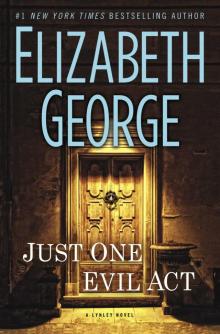 Just One Evil Act
Just One Evil Act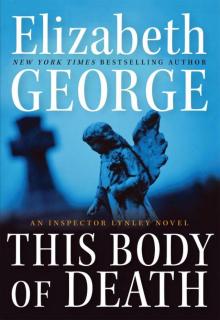 This Body of Death
This Body of Death The Edge of the Water
The Edge of the Water For the Sake of Elena
For the Sake of Elena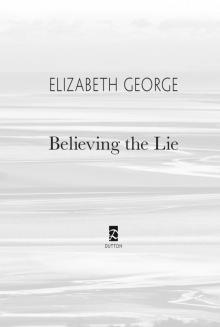 Believing the Lie
Believing the Lie The Edge of the Shadows
The Edge of the Shadows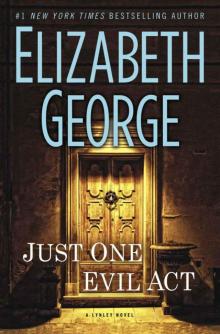 Just One Evil Act: A Lynley Novel
Just One Evil Act: A Lynley Novel In Pursuit of the Proper Sinner
In Pursuit of the Proper Sinner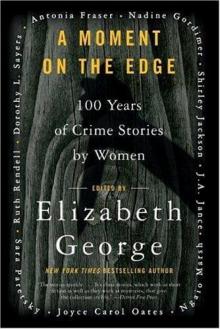 A Moment on the Edge:100 Years of Crime Stories by women
A Moment on the Edge:100 Years of Crime Stories by women Elizabeth I
Elizabeth I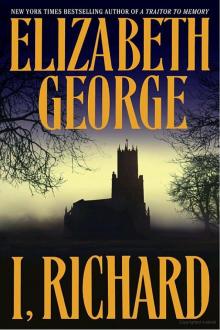 I, Richard
I, Richard A Traitor to Memory
A Traitor to Memory Missing Joseph
Missing Joseph A Suitable Vengeance
A Suitable Vengeance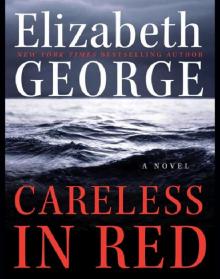 Careless in Red
Careless in Red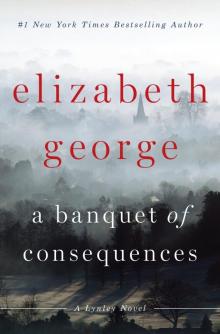 A Banquet of Consequences
A Banquet of Consequences Playing for the Ashes
Playing for the Ashes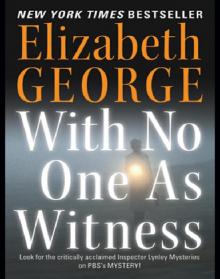 With No One As Witness
With No One As Witness Deception on His Mind
Deception on His Mind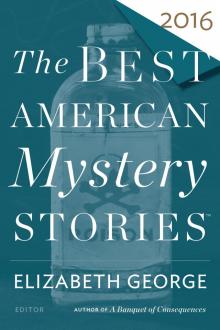 The Best American Mystery Stories 2016
The Best American Mystery Stories 2016 A Great Deliverance
A Great Deliverance In the Presence of the Enemy
In the Presence of the Enemy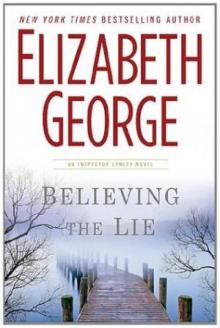 Believing the Lie il-17
Believing the Lie il-17 The Edge of the Light
The Edge of the Light SW01 - The Edge of Nowhere
SW01 - The Edge of Nowhere A Place of Hiding
A Place of Hiding What Came Before He Shot Her il-14
What Came Before He Shot Her il-14 Payment In Blood
Payment In Blood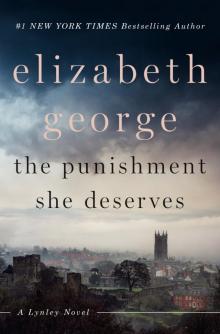 The Punishment She Deserves
The Punishment She Deserves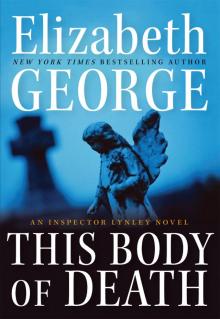 This Body of Death: An Inspector Lynley Novel
This Body of Death: An Inspector Lynley Novel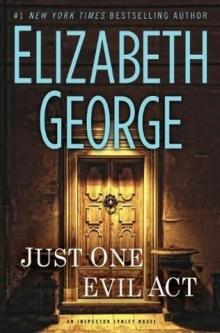 Just One Evil Act il-18
Just One Evil Act il-18 What Came Before He Shot Her
What Came Before He Shot Her Missing Joseph il-6
Missing Joseph il-6